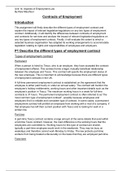Unit 14: Aspects of Employment Law
By Rais Mauthoor
Contracts of Employment
Introduction
This assignment will firstly describe the different types of employment contract and
explain the impact of relevant legislation/regulations on any two types of employment
contract. Additionally, it will identify the differences between contracts of employment
and contracts for services and analyse the impact of relevant legislation/regulations on
any two types of employment contract. Finally, it will evaluate the extent to which a
selected business organisation has adapted its working arrangements to accommodate
legislation relating to rights and responsibilities of employees and employers.
P1 Describe the different types of employment contract
Types of employment contract
Permanent
When a person is hired by Tesco, who is an employer, they have accepted the contract
of employment offered. This contract forms a legal, mutually beneficial relationship
between the employee and Tesco. This contract will specify the employment status of
the new employee. This is important to acknowledge because there are different types
of employment contracts in the UK.
A full-time permanent employment contract is established on the agreement that the
employee is either paid hourly or under an annual salary. The contract will mention the
employee’s holiday entitlements, working hours and other important details such as the
employee’s position in Tesco. The maximum working hours in a week for full-time
contracts is 37 hours. The permanent employment contract is often referred to as “the
most common type of employment contract”, possibly because employees and
employers find it a reliable and consistent type of contract. In some cases, a permanent
employment contract will prohibit an employee from working with a rival of a company, if
that employee has left their current position with Tesco and is looking for work in a
similar role.
Part time
A part-time Tesco contract contains a large amount of the same details that exist within
a full-time Tesco contract; however, the main difference is the working hours that the
employees are committed to. Working hours for this type of contract are shorter,
typically a part-time employee would work in the weekends. They may be busy on
weekdays and therefore cannot work Monday to Friday. The law protects part-time
workers from being treated unfavourably on the basis that they are employed part-time.
Fixed term






